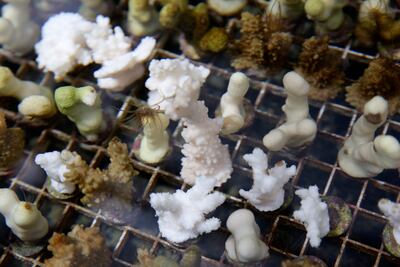Earlier this month, we marked World Oceans Day, as we have been doing for a number of years. But this year was not just another celebration. The 2022 edition heralds the coming together of the world at the UN Oceans Conference 2022 in Lisbon to deliver decisive action against crises that continue to threaten our oceans – from marine pollution to climate change.
The second of its kind forum, co-organised by the governments of Portugal and Kenya, convene from 27 June to 1 July, to launch a global effort to rebuild marine life. The agenda is to keep oceans healthy so they can support human well-being for generations to come. In a world plagued with pessimism, more than 5,000 ocean advocates, including world leaders, scientists, entrepreneurs and the youth will aim to mobilise action to inspire positive change across the "blue economy".

The "blue economy" fosters holistic economic growth, founded on sustainable support of other marine sectors. Its potential is evident with the rise of auxiliary concepts such as Blue Foods, providing nutritious food with a low-carbon footprint to combat hunger and malnourishment while addressing climate change; Blue Carbon, conserving and restoring marine habitats to mitigate climate change and enhance coastal protection; Blue Biotechnology, harnessing innovative technology across the food, health, environment, and energy sectors; Blue Growth, leveraging ocean-based sectors to accelerate global wealth and jobs; and Blue Natural Capital, rebuilding marine life to provide a broad and generous suite of benefits to coastal communities.
All of these opportunities rest on the premise of a healthy ocean in the pursuit of the United Nations Sustainable Development Goal 14: to “conserve and sustainably use the oceans, seas, and marine resources for sustainable development”.

But solely relying on technology is not enough. True success will not be possible without harnessing the collective potential of governments, scientists and corporations. To make a real impact in our ocean’s health and sustainability, our efforts must be grounded in multi-faceted preparatory processes, such as the one initiated by the high-level panel for a sustainable ocean economy.
The global policy body found that the ocean and climate are inextricably linked. Ocean-based solutions could reduce approximately four billion tonnes of greenhouse gas emissions annually in 2030 and more than 11 billion tonnes in 2050.
As a result, they worked with governments, businesses, financial institutions, the science community, and civil society to release a number of “blue papers” to guide global discussions across policy, governance, technology and finance.
The UN World Food Systems Summit in September last year consolidated the strategic power of Blue Foods as a key takeaway, particularly relevant as the war in Ukraine is causing an imminent food crisis.
The World Trade Organisation is completing efforts towards addressing harmful subsidies that maintain illegal and unreported fishing. The Convention of Biological Diversity is preparing biodiversity targets, including those for marine biodiversity, and in March 2022, 175 nations approved the Nairobi Declaration to set a legally binding framework to put an end to plastic pollution by 2024. The UN Law of the Sea is addressing the governance of biological resources in the high seas, which had been left orphan of consideration in the past. And the UN Decade of Ocean Science for Sustainable Development (2021-2030) is addressing 10 challenges to prevent, halt and reverse the degradation of ocean ecosystems.
As international bodies like the panel and UN Oceans Conference seize opportunities to confront the climate crisis, there is a strong cause for hope. We are headed in an optimistic direction; one that diverges from the concept that the ocean is “Terra nulis”, a no-man’s land. Instead, collective, conscious deliberation is charting a new course that recognises the ocean as “Terra omnium”, a shared responsibility and resource for all. Indeed, all life is sustained by this single body of water.
To truly foster a resilient, sustainable and equitable ocean economy international co-operation in marine conservation must continue, as must trade and investment that is sustainable and responsible. This is the kind of transformative change we need for it is what will benefit future generations.


